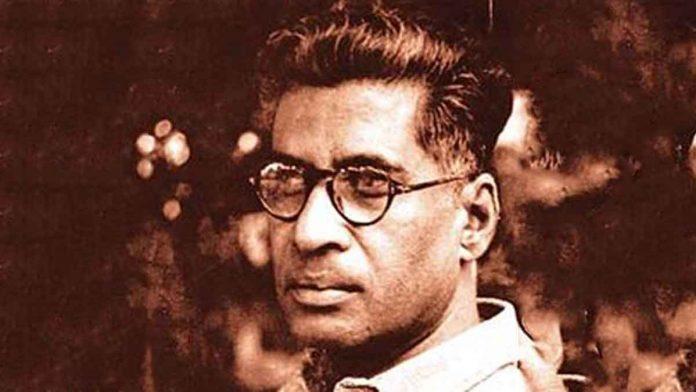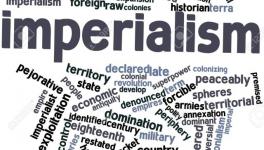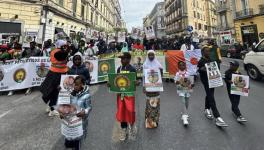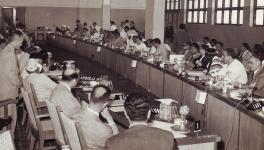MN Roy: An Unmatched Political Philosopher

The Manbendra Nath Roy or MN Roy we know of, was born on the campus of Stanford University in the United States at the age of 29. Until then, he was Narendranath Bhattacharya, who had left India to travel across the world, participating in movements.
When he left India in search of arms to fight the British, it is said, he assumed a new name to dodge the police and CID in India. Reminiscing in his memoir, Roy says that the day after he landed in the US, newspapers carried headlines such as “Mysterious Alien Reaches America: Famous Brahmin Revolutionary or Dangerous German Spy?”
Roy is counted among the foremost 20th century philosophers. He advocated a political renaissance to rejuvenate the country with morality and physical realism—his term for materialism. He was the father of neo-humanism, with his contribution to Indian politics and development of communist thought considered formidable.
He occupied leading positions in modern India’s great movements of nationalism, communism and ‘new humanism’. Though among his Indian contemporaries, he was often regarded a failure, as his views did not find support within nationalist schools. To understand Roy in brief, one has to divide his life into three parts.
Roy, the Internationalist
Noted writer P Rajeswar Rao notes in his book, The Great Patriots of India, that Roy did not feel much of a sense of debt to his birthplace and cut off links with his family early on.
As destiny would have it, after he landed in America, he was arrested in connection to the Indo-German Conspiracy. He jumped parole and escaped to Mexico where he became non-official advisor to Mexican revolutionary, President Jose Carranza. In turn, Carranza helped him in carrying out his political activities. Roy was instrumental in founding the first communist party outside the Soviet Union, in Mexico.
While in Mexico, he wrote about world peace being more conditional upon the liberation of the colonies than upon the overthrow of capitalism. His political work in Mexico made Lenin interested in him as a symbol of a future ‘revolution in the East’ and he was invited to Russia. Roy, yet, was to advocate that nationalism is mere emotional upsurge and has no political or cultural basis.
Roy did not concur with Hitler's ‘socialism’ either. He was among the few who declared that the treaty of non-aggression between Germany and Russia in the Second World War would be broken soon. He had also predicted the possibilities of the Cold War. Thus, to many, Roy was the first international political leader, before Jawaharlal Nehru. His associate, GD Parikh, had expressed the view that Roy was the first Indian thinker to appreciate the significance of the major breach in the citadel of imperialism by the forces generated by the second World War.
Roy as an Indian Freedom Fighter
Roy’s role in India’s struggle unearths astonishing similarities and stark differences between him and Gandhi. Gandhism arose in India almost at the same time as Marxism entered the political sphere and modern Indian political thought has been largely influenced by the interaction of these two ideas.
However, the Indian National Congress, under the leadership of Gandhi, never advocated a casteless society. Though Gandhi spoke of abolishing untouchability, he did not openly disown the caste system.
Roy’s radical humanism was neither of nation, nor of class or even caste. He advocated that though the Industrial Revolution changed Europe altogether, but in India, the craft industry was replaced by machines, only for the interests of British society. According to him, the machine age in Europe forced the hunt for raw materials which created colonies, including India. Roy believed that due to this, the development of an urban proletarian society was delayed in India; or, there was no reason why the country would remain untouched by the Industrial Revolution.
Roy’s views on the role of bourgeoisie in colonial countries are to be found in the supplementary thesis on the national and colonial question which he prepared for the Colonial Commission of the Second Congress of the Communist International. Even Lenin submitted his theses on the same topic.
Roy differed with Lenin on the particular social force in the colonial countries that should be assisted by the communists. Roy proposed assistance to proletarian parties of the colonies and through them to the revolutionary movement in general. Whereas Lenin’s ideas meant that the Communist International should support parties such as the Indian National Congress, Roy’s views could have meant supporting other parties to further the cause of liberation.
Roy felt that the possibilities of a revolution for independence in India are very slim. According to him, the British government was aware of the anger spreading among the people, and before it turned into a revolution, it would make concessions to bourgeois society. Echoing Roy’s view, socialist Ram Manohar Lohia once said that India’s freedom movement was fought and won by the proletariats and its fruits were enjoyed by the bourgeoisie.
British writer and intellectual Phillip Spratt, who had spent considerable time in India, believed that “Lenin wanted to destroy the bourgeois world… [while] Roy… maintained that Indian bourgeois would not revolt but would gradually acquire de facto power.”
When Roy returned to India in 1930, he was arrested by the British on charges of conspiracy. He was sentenced to 11 years in prison, which was later reduced to six years. It’s interesting to know that the great scientist Albert Einstein appealed to the British government for his release as he was highly impressed by Roy’s article, Philosophy of Modern Science.
After his release, Roy and his wife Ellen joined INC. He became a Gandhian, but not for long. This sudden change of thought in his ideas was due to Gandhi’s role in controlling massacres. Spratt writes, “Roy was deeply moved…henceforth a new respect for Gandhi showed in his writings”. Though he was an admirer of Gandhi’s personal qualities and leadership abilities, yet he did not believe in Gandhism.
According to him, Gandhi’s ideas represented an attempt to re-establish the old spiritualism in India. He opined that Gandhi’s doctrines got coinage due to persistent cultural backwardness in India. Roy also believed that Gandhi’s leadership inadvertently played the role of cooling the fires of a rational revolution amongst the masses. He felt that Gandhi’s Quit India Movement against the British would amount to favouring Hitler and that if the latter won the ongoing war, colonies like India would drift further from freedom.
In 1939, Roy launched Radical Democratic Party and in its parliamentary session held in 1946, a 22-point agenda was adopted that served as the basis for his ‘radical humanism’ ideas, which occupied the later part of his life.
A lesser-known fact is that he played a pivotal role in drafting the Indian Constitution. Socialist Acharya Narendra Dev was of the view that Roy prepared the Karachi Proposal Draft that is the basis of the Directive Principles of the State Policy, but Nehru did not accept this.
In his book, Indian Constitution: Cornerstone of a Nation, the American historian Granville Austin credits Roy with introducing the idea of socialism in the Indian Constitution.
Roy as Humanist
According to experts, when he became disillusioned with Marxism, Roy started leaning towards liberalism. Largely, it was after the Second World War. He delved into “neo-humanism” from here on, launching in 1948, the Radical Humanist Movement in India and writing several books on it. Neo-humanism believed in endless possibilities of freedom and, like Gandhi, Roy emphasised the importance of means to achieve this goal. To him, freedom of man lies in the expansion of knowledge as well as aspirations.
Roy held the view that each ideology is based on already-available knowledge that is bound to a pre-determined goal and urged people to develop a scientific temperament and rationality. In his discourse on material philosophy, he surmised that nothing is permanent, sacrosanct or eternal, and that man, to change the world, must change himself in the process.
The author is a freelance journalist. The views are personal.
Get the latest reports & analysis with people's perspective on Protests, movements & deep analytical videos, discussions of the current affairs in your Telegram app. Subscribe to NewsClick's Telegram channel & get Real-Time updates on stories, as they get published on our website.
























